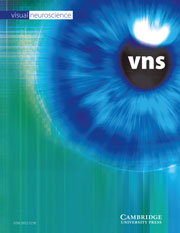Article contents
Spectral sensitivity of melatonin synthesis suppression in Xenopus eyecups
Published online by Cambridge University Press: 01 March 1998
Abstract
Melatonin synthesis in retinal photoreceptors is stimulated at night by a circadian oscillator and suppressed acutely by light. To identify photoreceptor mechanisms involved in the acute suppression of melatonin synthesis, an action spectrum was measured for dark-adapted Xenopus laevis eyecups at night. Intensity–response curves at six wavelengths from 400 to 650 nm were parallel, suggesting that a single photopigment predominates in melatonin suppression. Half-saturating intensities at 400, 440, 480, and 533 nm were not significantly different from one another, at 1–2 × 108 quanta cm−2 s−1. Significantly higher intensities of 580- and 650-nm light were required for melatonin suppression. These results indicate a predominant role for the principal green-absorbing rods in acute regulation of retinal melatonin synthesis in response to light, and argue against an important role for the red-absorbing cones. Higher than expected sensitivity at short wavelengths suggests that photoreceptors sensitive to blue and/or violet light may also contribute to melatonin suppression.
- Type
- Research Article
- Information
- Copyright
- 1998 Cambridge University Press
- 8
- Cited by


